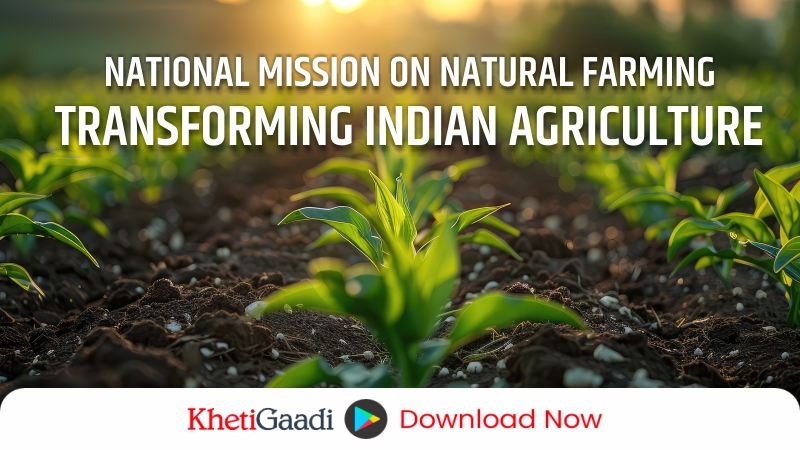In recent years, there has been a growing interest in sustainable agricultural practices in India. The National Mission on Natural Farming (NMNF) is an initiative launched by the Indian government to promote chemical-free, environmentally sustainable farming. With a focus on improving soil health, reducing input costs, and supporting small and marginal farmers, NMNF aims to bring natural farming methods to the forefront of Indian agriculture. This blog explores the concept of natural farming, its benefits, the NMNF scheme, and how farmers can benefit from this initiative.
What is Natural Farming?
Natural farming is an agricultural practice that emphasizes the use of natural resources and biological processes to grow crops without synthetic fertilizers, pesticides, or genetically modified organisms (GMOs). It is based on the principles of working with nature rather than relying on external chemical inputs. The philosophy of natural farming aligns with the traditional farming methods practiced by Indian farmers for centuries, promoting ecological balance, biodiversity, and sustainability.
The key principles of natural farming include:
- Zero chemical inputs: No synthetic fertilizers or pesticides are used. Instead, natural inputs such as farmyard manure, green manure, and compost are utilized.
- Soil health management: Natural farming focuses on enriching the soil through organic matter and microbial activity, ensuring long-term fertility.
- Biodiversity: A mix of crops and the integration of livestock helps create a balanced ecosystem.
- Water conservation: Natural farming techniques help in conserving water by improving soil structure and increasing water retention capacity.
Some popular natural farming methods in India include Zero Budget Natural Farming (ZBNF), Rishi Krishi, and Vedic Farming. These methods advocate using locally available resources and reducing farmers’ reliance on costly external inputs.
Benefits of Natural Farming
Natural farming offers a range of benefits, both for the environment and for the farmers who adopt these practices. Here are some key advantages:
- Enhanced Soil Health: By avoiding chemical inputs and focusing on organic matter, natural farming improves soil structure, microbial activity, and nutrient availability, leading to healthier soils.
- Reduced Input Costs: With no need for chemical fertilizers, pesticides, or external seeds, natural farming significantly reduces input costs for farmers, making agriculture more affordable.
- Sustainability: Natural farming is a sustainable agricultural model as it works in harmony with the environment, conserving water, protecting biodiversity, and reducing pollution caused by chemical inputs.
- Higher Profit Margins: Although yields may initially be lower, over time, the reduced input costs and premium prices for organic produce can lead to higher profit margins for farmers.
- Healthier Produce: The crops grown through natural farming are free from harmful chemicals, offering consumers healthier, pesticide-free food options.
- Climate Resilience: Natural farming practices improve the resilience of crops to climate-related stresses such as droughts and floods by enhancing soil moisture retention and promoting biodiversity.
- Environmentally Friendly: By avoiding synthetic chemicals and promoting biodiversity, natural farming contributes to environmental conservation, reduces soil and water contamination, and helps mitigate climate change.
National Mission on Natural Farming (NMNF) Scheme
The National Mission on Natural Farming (NMNF) is an ambitious initiative launched by the Government of India to promote natural farming practices on a national scale. The mission aims to encourage farmers to transition from chemical-intensive farming to natural methods, thereby contributing to sustainable agricultural growth.
The key objectives of the NMNF scheme are:
- Promoting Natural Farming: The scheme aims to educate and incentivize farmers to adopt natural farming techniques, reducing the use of chemical fertilizers and pesticides.
- Training and Capacity Building: Under the NMNF scheme, farmers are provided with training on natural farming practices through workshops, field demonstrations, and farmer schools. The mission collaborates with institutions such as Krishi Vigyan Kendras (KVKs) and agricultural universities to ensure the successful transfer of knowledge to farmers.
- Financial Assistance: Farmers who wish to adopt natural farming practices are eligible for financial support under NMNF. This includes subsidies for inputs like composting units, bio-fertilizers, vermicomposting, and water conservation systems.
- Research and Development: NMNF promotes research on natural farming techniques, soil health, and organic inputs. This research helps in creating region-specific solutions for farmers and ensures the effectiveness of the methods.
- Market Linkages: To support farmers in selling their natural produce, the NMNF scheme facilitates market linkages through government procurement, farmer producer organizations (FPOs), and cooperatives. This helps ensure better prices for naturally grown crops.
- Monitoring and Evaluation: The scheme has a robust monitoring system to track the progress of natural farming adoption across the country. Regular evaluations help in fine-tuning the mission and addressing challenges faced by farmers.
How Farmers Benefit from the NMNF Scheme?
The NMNF scheme is designed to empower farmers by providing them with the necessary tools, knowledge, and financial support to shift toward natural farming. Here are the key ways in which farmers benefit from the scheme:
- Reduced Farming Costs: By eliminating the need for expensive chemical inputs, farmers experience a significant reduction in their overall farming costs. The use of natural resources like farmyard manure, bio-fertilizers, and compost helps in cutting input expenses.
- Access to Subsidies: Under the NMNF scheme, farmers receive subsidies for setting up composting units, rainwater harvesting systems, and other natural farming infrastructure. This financial aid reduces the initial investment required for transitioning to natural farming.
- Training and Knowledge Sharing: The NMNF scheme offers extensive training programs that equip farmers with the knowledge needed to adopt natural farming techniques. This knowledge transfer empowers farmers to manage their farms more effectively and sustainably.
- Improved Soil Health: With the adoption of natural farming, farmers can improve soil fertility and structure, ensuring long-term productivity without the need for chemical interventions. Healthier soils lead to higher yields over time.
- Premium Pricing for Natural Produce: Farmers who grow crops using natural farming methods can market their produce as “organic” or “chemical-free,” attracting premium prices in both domestic and international markets. This results in higher profit margins.
- Increased Climate Resilience: By enhancing soil health and biodiversity, natural farming makes farms more resilient to extreme weather conditions such as droughts and floods, helping farmers mitigate the impacts of climate change.
- Community Support: The NMNF scheme encourages the formation of farmer collectives and cooperatives, enabling small and marginal farmers to share resources, knowledge, and market opportunities.
Success Stories
1. A Farmer’s Transition in Andhra Pradesh
In the Anantapur district of Andhra Pradesh, a group of farmers adopted Zero Budget Natural Farming (ZBNF) techniques under the NMNF scheme. They were trained by the state government and equipped with vermicomposting units and bio-fertilizers. After the transition, farmers reported a 30% reduction in input costs, increased soil fertility, and higher resilience to drought. Today, these farmers earn better prices by selling their natural produce in both local and international markets.
2. Natural Farming in Himachal Pradesh
A small farmer from Mandi, Himachal Pradesh, decided to switch to natural farming practices after attending an NMNF training workshop. He received financial assistance to set up a rainwater harvesting system and a vermicomposting unit. Within two years, the farmer saw a significant improvement in his farm’s soil health and a reduction in pest-related crop losses. The produce from his farm is now sold as organic, fetching premium prices.
3. Organic Success in Gujarat
A woman farmer from Surat, Gujarat, transitioned to natural farming with the help of the NMNF scheme. She initially faced challenges but persevered with the support of local agricultural officers and farmer groups. Today, she grows vegetables using organic methods and sells her produce in local markets at a 20% higher price than chemically grown crops. Her success has inspired other women in the region to adopt natural farming.
Conclusion
The National Mission on Natural Farming (NMNF) is a forward-thinking initiative that is revolutionizing Indian agriculture. By promoting chemical-free, sustainable farming methods, the mission aims to restore soil health, improve farmers’ livelihoods, and make Indian agriculture more resilient to climate change. Natural farming is not just a return to traditional methods; it is a scientifically-backed, sustainable solution for the future of farming in India.
Farmers across the country are already reaping the benefits of this initiative, as highlighted by the success stories shared in this blog. With continued support from the government and greater adoption of natural farming methods, India is poised to lead the way in sustainable agriculture.
Relevant Links
National Mission on Natural Farming (NMNF) Guidelines
Zero Budget Natural Farming by Andhra Pradesh Government
Krishi Vigyan Kendra (KVK) – Agricultural Training Centres
Tags




